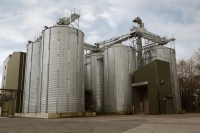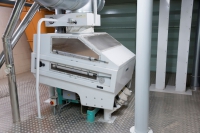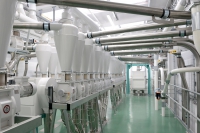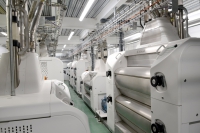Flour Mill
Wheat
Wheat, the raw material of flour milling, is far the most important and widely cultivated of the worlds main cereal crops. Wheat is grown in every climate from the freezing winter of Canada to the dry and overpowering heat of India. At Ripon Select Foods Ltd. it has been established that the home grown varieties produce a flour with the best characteristics for our Crumb and Rusk production.
Quality Control of Wheat
All wheat purchased by Ripon Select Foods Ltd is from ‘Farm Assured’ producers. A wide variety of tests are carried out at intake to ensure that the wheat meets specification, for example, moisture content and protein. All testing is carried out to the National Association of British and Irish Millers Standard for Intake Laboratories with all internal systems audited annually.
Cleaning of Wheat
On arrival at the mill the wheat will contain a certain percentage of impurities, such as sand, stones, chaff and straw. The flour mill being a modern process, has an elaborate cleaning plant for removing these impurities before grinding the wheat into flour: the methods of separation are many and ingenious, taking advantage of the difference in size, shape, specific gravity and behaviour in air currents of the wheat and various impurities.
Milling into Flour
The main objective in the production of white flour from wheat is to remove the endosperm (starch and protein) from the outer bran skins in as pure a state as possible before reducing the particles into fine flour.
Break System
The process consists of a series of rollermills that opens up the grain kernels and scrapes off the endosperm. The resultant material is then sifted and graded on a series of sieves which have various sized meshes.
Gradual Reduction System
The system consists of a series of rollermills and plansifters where the endosperm is ground to finer particles and the flour is removed by sieving. The remaining fractions then move onto the next stage of grinding and sifting; this happens repeatedly until all the flour has been separated from the outer skin. There are normally four break passages and ten reduction passages in the flour milling with stock being moved pneumatically around the mill process.
Finished Product
Flour is inspected at all stages of the milling process with a final quality control check prior to it being pneumatically blown into silos; it is then used for the manufacture of Rusk, Breadcrumb or Battermixes.









